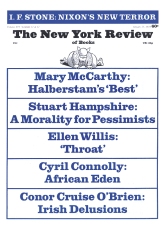1
What shall I do with myself, now it’s January?
The gaping city staggers and clings.
I think it’s the locked doors that have made me drunk.
I could howl out of every lock and paper clip.
The stocking-lanes barking,
knitted streets of junk rooms,
idiots ducking into corners
to jump out of them—
in the pit, in the warty darkness,
I’m slipping toward the frozen pumphouse.
I fall over my feet. I swallow dead air.
A fever of crows explodes.
And after that, there I am, gasping,
drumming on an icy wooden tub:
“Somebody read me! Somebody lead me! Somebody heal me!
Somebody say something on the jagged stairs!”
2
Sunderings of round bays, the gravel, the blue,
and the slow sail turning at last into a cloud—
almost before I prized you I was taken from you.
Longer than organ fugues, and bitter, is the sea grass,
pretending to be hair, and smelling of the long lie.
My head is awash with an iron tenderness.
Rust is nibbling along the gradual shore…
Why was this different sand put under my head?
O guttural Urals, broad-shouldered lands of the Volga,
wide plains facing me—all my rights are there,
and I must still fill my lungs with them.
3
Maybe this is the beginning of madness.
Maybe it’s your conscience:
a knot of life in which we are seized and known
and untied for existence.
So in cathedrals of crystals not found on earth
the prudent spider of light
draws the ribs apart and gathers them again
into one bundle.
And gathered together by one thin beam
the bundles of pure lines give thanks.
One day they will meet, they will assemble
like guests with the visors up,
and here on earth, not in heaven,
as in a house filled with music,
if only we don’t offend them, or frighten them away.
How good to live to see it!
Forgive me for what I am saying.
Read it to me quietly, quietly.
4 WINEJUG
Bad debtor to an endless thirst,
wise pander of wine and water,
the young goats jump up around you
and the fruits are swelling to music.
The flutes shrill, they rail and shriek
because the black and red all around you
tell of ruin to come
and no one there to change it.
5
As though the fame of its mint and iota
were never enough, the Greek flute,
free, following its instincts,
matured, labored, crossed ditches.
No one can escape it,
nor quiet it, through clenched teeth,
nor coax it into speech with the tongue,
nor shape it with the lips.
And peace will never come to the flutist.
He feels that he is alone.
He remembers molding his native sea
out of lilac clays, long ago.
With a sonorous climbing whisper,
with the patter of lips remembering,
he hurries to be thrifty,
he selects sounds, a neat miser.
When he’s gone, we’ll have no one
to knead lumps of clay to death.
When the sea filled me
my measure sickened me.
And in my own lips there’s no peace.
Mouther’s too close to murder.
I let the flute’s equinox
drop lower and lower.
6
Just for its potters the dark blue island,
Crete, the lighthearted, is great. When the earth they baked
rings you can hear their genius.
Do you hear fins of dolphins beating deep in the earth?
Speak of this sea and it will rise
in the clay, to smile in its oven.
And the frigid power of the vessel
became half sea, half eye.
Blue island, give me back what is mine.
Flying Crete, give back my work to me.
Fill the baked vessel
from the breasts of the flowing goddess.
This was, and was sung, and turned blue
in days before Odysseus,
before food and drink
were called “my,” “mine.”
Grow strong again and shine
o star of ox-eyed heaven,
and you, flying fish of chance,
and you, o water saying yes.
This Issue
January 25, 1973



